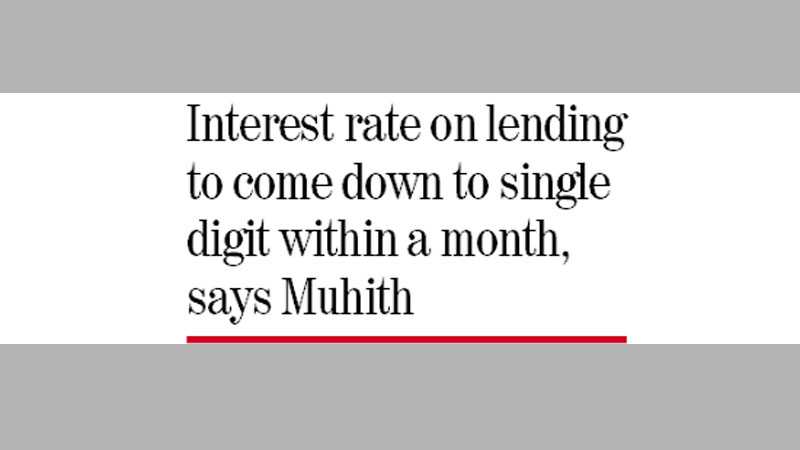Cash reserve ratio cut to inject Tk 10,000cr

The government has decided to give the banking sector a Tk. 10,000-crore shot in the arms to help it recover from an acute liquidity crisis. Facing repeated pleas from bank owners to shore up the banking system, finance minister AMA Muhith, yesterday, announced a 1 per cent reduction in the cash reserve ratio (CRR), which would release the aforementioned amount.
The minister made the announcement after a closed-door meeting with private bank owners and top bank executives at a city hotel. This was for the second time in the last three days that Muhith met top bankers to find out solutions for the prevailing liquidity crunch.
Private commercial banks have been facing liquidity crisis in the past few months due to withdrawal of funds by a number of depositors, including government agencies.
The reduction in CRR—the minimum fraction of customer deposits each commercial bank must hold as reserves in the central bank for risk management—is likely to give some cash-starved private banks “much needed” funds for meeting their customers’ needs.
The minister said the cut in CRR would also help bring down the interest rate on lending to a single digit, “within a month”.
On the other hand, Nazrul Islam Mazumder, chairman of Bangladesh Association of Banks (BAB)—an organisation of bank owners—said reducing the lending rate to a single digit within a month was unrealistic.
Talking with reporters after the meeting, in which, Bangladesh Bank governor Fazle Kabir was also present, Mazumder said the BAB was well aware of the need for reducing the lending rate.
“I am a bank owner and also a businessman. I also bleed money by paying interest rates in double digits. No one can sustain a business by paying 14-15 per cent interest rate,” said Mazumder. “But reducing it to a single digit is not possible in such a short time,” he added.
At a meeting on Friday, Mazumder had requested the finance minister and BB governor to reduce the CRR to 3.5 per cent from the present 6.5 per cent. “They have agreed to reduce it by 1 per cent which would inject Tk 10,000 crore in the banking system,” he said yesterday.
Along with this fresh injection of money through the reduction of CRR, the government, on Friday, had decided to allow state agencies to deposit 50 per cent of their funds with private banks, up from the existing ceiling of 25 per cent, to tackle the liquidity crisis.
Terming this as a positive step, the BAA chairman said, “This will definitely reduce the cost of funds for the banks.”
In the past few months, a series of loan scams regarding farmers in some banks had dented depositors’ confidence in private banks, which subsequently led to the liquidity crisis.
Most government agencies are now reluctant to deposit their money in private banks, thinking that they are fundamentally weak and a number of these agencies have already withdrawn a significant amount of their deposits from private banks.
Following these withdrawals, a number of banks have been scuppering for deposits to adjust their loan-deposit ratio, thereby pushing up the interest rate for deposits.
While this was a positive news for depositors, it also pushed up the interest rates for lending. There is adequate liquidity in the country, as the call money market rate suggests: it is less than 4 per cent.
Meanwhile, most of the private commercial banks, which have crossed the loan-deposit ratio (LDR) limit, are chasing after deposits to bring down the ratio within 85 per cent, as they cannot recover loans overnight. An 85-per cent LDR limit means a bank can give a loan of Tk. 85 against a deposit of Tk. 100.
Of the 57 banks, the loan-deposit ratio of 38 banks is lower than 83 per cent already. To adjust to the new ceiling, banks will have to increase the total deposit by Tk. 11,000 crore. Talking to The Independent, economist Mirza Azizul Islam criticised the government move of injecting money into the banking system by reducing CRR and allowing state-owned agencies to deposit money into commercial banks.
He said instead of ensuring good governance in the country’s crisis-riddled banking sector, the authorities were desperate to save bad banks.
“First, the banks should improve their management capacity to recover their bad debts and continue their business with the recovered money. Injecting public money into bad banks can never be a good practice,” he said.
Source: http://www.theindependentbd.com
Tags :
Previous Story
- Pvt sector investment key for green transformation
- Banking in Bangladesh
- Prospect of jute in Bangladesh
- Remittance constitutes 7.24pc of Bangladesh's GDP
- Remittance constitutes 7.24 percent of Bangladesh’s GDP
- Info barred by central bank
- Bangladesh to introduce one-stop investment service from June
- Export earnings from US on rise